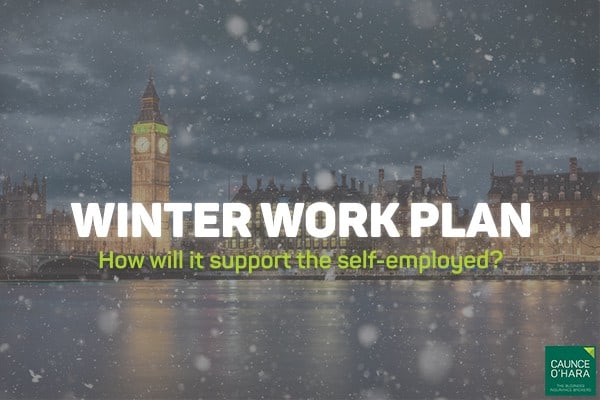
Winter Work Plan, how will it support the self-employed?
Posted on 5th October 2020 by Katherine Ducie
After cancelling this year’s Autumn Budget, the chancellor has revealed his Winter Economy Plan to protect jobs in the UK over the next six months.
For freelancers and contractors, the plans include extending the Self-Employment Income Support Scheme (SEISS) until April 2021 and providing a 12-month extension on self-assessment tax payments.
From support schemes to taxes and business loans, here’s a roundup of the Winter Work Plan and a summary of what this means for the self-employed.
Self-Employment Income Support Scheme (SEISS)
SEISS, which was initially set to end in October, will now be extended until the end of April 2021 at a decreased rate.
In their plan, the government say: “An initial taxable grant will be provided to those who are currently eligible for SEISS and are continuing to actively trade but face reduced demand due to coronavirus.
“The initial lump sum will cover three months’ worth of profits for the period from November to the end of January next year. This is worth 20% of average monthly profits, up to a total of £1,875” (1).
A second grant will be available to cover self-employed income from February – April 2021, although this may be adjusted depending on circumstances.
Up until now, the scheme has provided a grant covering 80% of average monthly trading profits of up to £2,500 a month. From November onwards this will drop by 60%, covering just 20% of average monthly profits.
Tax deferrals
Self-assessment taxpayers are being given the option to extend the repayment of their outstanding tax bill by 12 months. This means payments deferred from July 2020 and those due in January 2021, will not need to be paid until January 2022.
The government has also announced that those businesses who had deferred their VAT bills will be given the chance to pay back their VAT in smaller payments over the year. This comes as an alternative to paying a lump sum at the end of March 2021.
The Chancellor’s post-furlough plan at a glance
Job Support Scheme
- Government will fund up to £697.92 per month for each employee working fewer than normal hours due to lower demand
- Employees must work at least 33% of their normal hours and will receive 77% of their usual pay
- Hours worked will be paid for by employers
- The government and the employer will pay one third each for the hours employees cannot work
- All small and medium sized businesses will be eligible for the scheme
- Larger businesses will be eligible if their turnover has fallen during the Covid-19 crisis
- The scheme is open to employers across the UK even if they have not previously used the furlough scheme
- Due to run for six months from November replacing the furlough scheme
- The government will pay up to 22% of a worker’s wages, down from 80% at the start of the furlough policy.
Support for the self-employed
- The self-employed grant is to be extended on similar terms to the Job Support Scheme
- The grant will cover three months’ worth of profits for the period from November to the end of January.
- It will cover 20% of average monthly profits up to a total of £1,875
- A further grant may be available to the self-employed to cover February – April 2021, depending on circumstances.
Business loans
- Bounce Back Loans extended from six years to 10, cutting monthly repayments by nearly half
- Coronavirus Business Interruption Loan Scheme lenders also able to extend loans to 10 years
- The deadline for the government’s coronavirus loan schemes extended to the end of November
- Struggling businesses can opt to make interest only payments or suspend repayments altogether for six months
- Businesses will not see their credit rating fall as a result.
Taxes
- 15% emergency VAT cut for the tourism and hospitality industries extended to 31 March 2021
- Businesses who deferred VAT bills will be able to pay their taxes in 11 small interest-free instalments
- Self-assessment income taxpayers will be given more time to pay if they need it.
In summary
An extension to the support scheme will no doubt be welcomed by the self-employed freelancers and contractors who have faced great difficulty over the past six months.
The amount of financial support the SEISS grant will offer from November onwards is significantly decreasing to just 20% of average monthly profits, up to a total of £1,875. Arguably, this will not be enough to support those freelancers who are still struggling.
In total, the government has provided £13 billion of support to over 2.6 million self-employed people since the coronavirus lockdown began in March.
Despite this, there’s an estimated 1.5 million (2) self-employed freelancers and contractors who have so far gained no financial support and are not considered in the Winter Work Plan.
Those who were new to self-employment, self-employed on a part-time basis or earning above £50,000 remain to be ineligible for SEISS. This accounts for one in three self-employed people (3).
Andy Chamberlain, Director of Policy at IPSE (the Association of Independent Professionals and the Self-Employed) said:
“Based on the drastic financial hit self-employed people took in the last lockdown, the new 20 per cent cap on support is likely to be nowhere near enough. As well as plugging the gaping gaps in support, government must follow the situation closely and be ready to raise the amount of support SEISS offers if needed.
“The self-employed sector has already seen a record drop in the first half of 2020 because of the unnecessarily large gaps in government support. The self-employed are vital for the economy and will be essential for economic recovery, but to play their part, they must get the support they need now. Government must do better for them” (3).
With coronavirus and IR35 causing a reduction in the number of self-employed people in the UK, it’s been an extremely challenging year for freelancers and contractors.
At a time when the future and the threat of a second wave is uncertain, the effects of COVID-19 are still impacting many freelancers and contractors, in a big way.
Let’s hope that in six months from now, life will have taken some extra steps back to normality and that more self-employed businesses will begin to thrive once again.
If you are a contractor working in the construction, engineering or rail sectors, contact Caunce O’Hara for a quote for your business insurance on 0333 321 1403 or click to get a quick online quote in minutes!
Click here for a quick online business insurance quote
Related articles:
Comment on Self-Employed Income Support Scheme
How a claim for R&D tax relief can help your business right now
What are the changes to self-employed tax and how will they affect you?
Sources
- https://www.gov.uk/government/news/chancellor-outlines-winter-economy-plan
- https://www.ipse.co.uk/ipse-news/news-listing/tax-hike-unjust-uneconomical-unbelievable.html
- https://www.ipse.co.uk/ipse-news/news-listing/woefully-inadequate-government-self-employed.html


